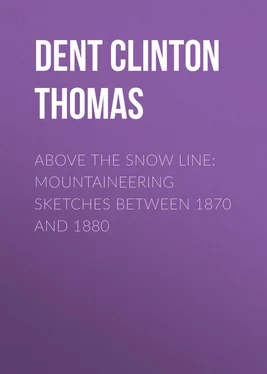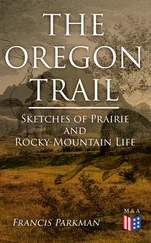Clinton Dent - Above the Snow Line - Mountaineering Sketches Between 1870 and 1880
Здесь есть возможность читать онлайн «Clinton Dent - Above the Snow Line - Mountaineering Sketches Between 1870 and 1880» — ознакомительный отрывок электронной книги совершенно бесплатно, а после прочтения отрывка купить полную версию. В некоторых случаях можно слушать аудио, скачать через торрент в формате fb2 и присутствует краткое содержание. Жанр: foreign_antique, foreign_prose, на английском языке. Описание произведения, (предисловие) а так же отзывы посетителей доступны на портале библиотеки ЛибКат.
- Название:Above the Snow Line: Mountaineering Sketches Between 1870 and 1880
- Автор:
- Жанр:
- Год:неизвестен
- ISBN:нет данных
- Рейтинг книги:4 / 5. Голосов: 1
-
Избранное:Добавить в избранное
- Отзывы:
-
Ваша оценка:
- 80
- 1
- 2
- 3
- 4
- 5
Above the Snow Line: Mountaineering Sketches Between 1870 and 1880: краткое содержание, описание и аннотация
Предлагаем к чтению аннотацию, описание, краткое содержание или предисловие (зависит от того, что написал сам автор книги «Above the Snow Line: Mountaineering Sketches Between 1870 and 1880»). Если вы не нашли необходимую информацию о книге — напишите в комментариях, мы постараемся отыскать её.
Above the Snow Line: Mountaineering Sketches Between 1870 and 1880 — читать онлайн ознакомительный отрывок
Ниже представлен текст книги, разбитый по страницам. Система сохранения места последней прочитанной страницы, позволяет с удобством читать онлайн бесплатно книгу «Above the Snow Line: Mountaineering Sketches Between 1870 and 1880», без необходимости каждый раз заново искать на чём Вы остановились. Поставьте закладку, и сможете в любой момент перейти на страницу, на которой закончили чтение.
Интервал:
Закладка:
The amateur and the guide
But there is more than this; on rocks the amateur is much less dependent on his guides and has much more opportunity of exercising his own powers. It must be admitted that on rocks some amateurs are occasionally wholly dependent not on, but from their guides, and take no more active share in locomotion than does a bale of goods in its transit from a ship’s hold to a warehouse. Too often the amateurs who will not take the trouble to learn something of the science and art of mountaineering are but an impediment, an extra burden, as has been often said, to the guides. The guides have to hack out huge steps for their benefit. The amateurs wholly trust to them for steering clear of avalanches, rotten snow bridges, and the like. The amateur’s share in a snow ascent usually consists, in fact, either in counselling retreat, insisting on progress, indicating impossible lines of ascent, or in the highly intellectual and arithmetical exercise of counting the number of steps hewn out to ensure his locomotion in the proper direction.
Place the unpaid climber, on the other hand, on rocks. Here the probability is that a slip will entail no unpleasant consequences to anyone but the slipper. The power of sustaining a sudden strain is so enormously increased when the hands have a firm grip that the amateur can, if he please, sprawl and scramble unaided over difficult places with satisfaction to himself and usually without risk to anyone else; that is, as soon as he has fully persuaded the guides (no easy task, I admit) that the process of pulling vehemently at the rope, possibly encircling his waist in a slip knot, is as detrimental to his equilibrium as it is to his digestion. Guides, however, as has been hinted, do not acknowledge this fact in animal mechanics, and their employers frequently experience as an acute torture that compressing process which, more deliberately applied, is not regarded by some as hurtful, but rather as a necessary accompaniment of fashionable attire. When the amateur has succeeded in overcoming the natural instinct of the guides to pull when there is no occasion to do so, he becomes a unit in the party, a burden of course, and a hindrance to some guides, but nothing to what he was on the snow.
Sentiments similar to the above have not unfrequently been set forth in print: they seldom, if ever, actuate the minds of mountaineers when actually engaged in their pastime or when describing their exploits to less skilled persons.
There is great satisfaction, too, in translating one’s self over a given difficult rock passage without other assistance than that provided by nature herself, and without surreptitious aid from one’s neighbour in the shape of steps. Then again, snow mountains are as inconsistent as cheap aneroids. One day each step costs much labour and toil, and almost the next perhaps the peak will allow itself to be conquered in one-tenth of the time. Not that the writer seeks to argue that there is no pleasure to be derived from snow mountains. It is to climbing per se that these remarks apply. After all, everyone has his own opinion; but he who has not tasted the pleasures of a really difficult and successful rock climb – especially if it be a new one – knows not what the Alps can really do for his amusement.
The guides’ room
An expedition of suitable magnitude and difficulty was suggested by the guides, viz. an ascent of the Rothhorn (or Moming) from the Zermatt side. Mr. Passingham of Cambridge was at the time staying at the Monte Rosa Hotel, and it was soon arranged that we should combine our forces. The guides, on being asked their opinion as to the projected climb, reported diplomatically that, given fine weather, the ascent would be difficult but possible. This is the answer that the guides generally do give. We decided to attempt the whole excursion in a single day, considering that a short rest in the comparatively luxurious beds provided by M. Seiler was preferable on the whole to more prolonged repose in a shepherd’s hut; for the so-called repose means usually a night of misery, and the misery under these conditions is apt to make a man literally acquainted with strange bed-fellows. At 2 in the morning we sought for the guides’ room, to superintend the packing of our provisions. It was not easy to find, but at last we discovered a dingy little subterranean vault with one small window tightly jammed up and covered with dust. Of this den there were two occupants. One was employed silently in eating large blocks of a curious boiled mess out of a pipkin. The other was smoking a very complicated pipe, and sitting bolt upright on a bench with half a bottle of vin ordinaire before him. Why he was carousing thus in the small hours was not evident. From these signs we judged correctly that the apartment was devoted to the guides as a dining, smoking, club and recreation room.
Our staff was already in attendance, and it struck both of us that the success of the expedition was a foregone conclusion if it depended on the excellence of our guides – Alexander Burgener, the embodiment of strength, endurance, and pluck; Ferdinand Imseng, of activity and perseverance, alone would have sufficed, but we had in addition a tough, weather-beaten, cheery companion (for he was always a companion as well as a guide), Franz Andermatten, ever sagacious, ever helpful and ever determined. It would be hard to find a successor adequately to fill our old friend’s place. It is impossible to efface his memory from my mind, nor can I ever forget how on that day he showed all his best qualities and contributed mainly to our success. 11 1 Franz Andermatten died in August 1883. His name is mentioned elsewhere in these sketches, but I leave what I have written untouched: for I do not hold with those who would efface the recollection of all that was bright and merry in one taken from us.
The prologue is spoken; let us raise the curtain on the comedy.
A false start
The guides had already made their usual preparations for packing up – that is to say, they had constructed a multiplicity of little paper parcels and spread them about the room. As to the contents of these little parcels, they were of course uncertain, and all had to be undone to make sure that nothing had been omitted. A good deal of time was thus lost, and nothing much was gained, except that we corrected the error of packing up a handful of loose lucifers and two tallow dips with the butter and honey in a glass tumbler. Then the parcels were stowed away in the knapsacks, the straps of course all rearranged and ultimately replaced by odds and ends of string. Eventually, at 3 A.M., we started, leaving the two occupants of the guides’ room still engaged in the same manner as when they first came under observation, and walked up the narrow valley running due north of Zermatt and leading towards the Trift Joch and the base of the mountain for which we were making. Having journeyed for about half an hour, it was discovered that the telescope had been left behind. Franz instantly started off to get it; not because it was considered particularly necessary, but chiefly on the ground that it is not orthodox to go on a new expedition without a telescope. We stumbled up the narrow winding path, and close below the moraine called our first halt and waited for Franz’s return. I selected a cool rock on which to complete the slumber which had been commenced in bed and continued on a tilted chair in the guides’ room. After waiting an hour we decided to proceed, as no answer was returned to our frequent shouts. Presently, however, a distant yell attracted our attention, and we beheld, to our astonishment, the cheery face of Franz looking down on us from the top of the moraine. Stimulated by this apparition, we pushed on with great vigour, clambered up the moraine, whose extreme want of cohesion necessitated a treadmill style of progression, and having reached the top passed along it to the snow. Here we bore first to the right, and then, working round, made straight for a sharp-topped buttress which juts out at a right angle from the main mass of the mountain. Arrived at a patch of rocks near the commencement of the arête, we disencumbered ourselves of superfluous baggage; that is to say, after the traditional manner of mountaineers, we discarded about three-fourths of the impedimenta we had so laboriously dragged up to that point, and of which at no subsequent period of the expedition did we make the slightest use. Next, we prepared for such rock difficulties as might present themselves, by buttoning up our coats as tight as was convenient, and decorated our heads respectively with woollen extinguishers like unto the covers placed by old maids over cherished teapots.
Читать дальшеИнтервал:
Закладка:
Похожие книги на «Above the Snow Line: Mountaineering Sketches Between 1870 and 1880»
Представляем Вашему вниманию похожие книги на «Above the Snow Line: Mountaineering Sketches Between 1870 and 1880» списком для выбора. Мы отобрали схожую по названию и смыслу литературу в надежде предоставить читателям больше вариантов отыскать новые, интересные, ещё непрочитанные произведения.
Обсуждение, отзывы о книге «Above the Snow Line: Mountaineering Sketches Between 1870 and 1880» и просто собственные мнения читателей. Оставьте ваши комментарии, напишите, что Вы думаете о произведении, его смысле или главных героях. Укажите что конкретно понравилось, а что нет, и почему Вы так считаете.


![Рута Шепетис - Ashes in the Snow [aka Between Shades of Gray]](/books/414915/ruta-shepetis-ashes-in-the-snow-aka-between-shades-thumb.webp)









